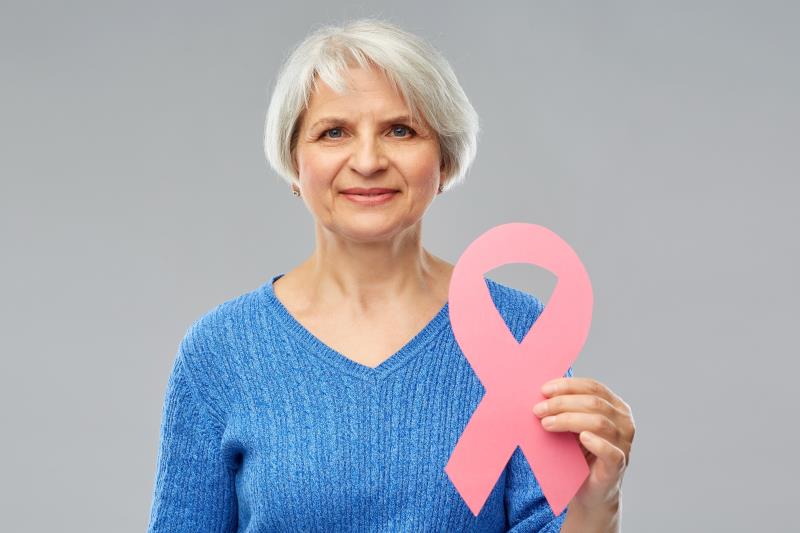Menopausal hormone therapy has varying effects on breast cancer incidence, mortality





The association between menopausal hormone therapy and breast cancer incidence and mortality may differ according to therapy type, a recent study showed.
The study was based on a median >20 years of follow-up of two Women’s Health Initiative (WHI) hormone therapy trials comprising 27,347 postmenopausal women aged 50–79 years (mean age 63.4 years) without prior breast cancer. The first trial involved 16,608 women with intact uterus who had been randomized to receive conjugated equine oestrogen (CEE; 0.625 mg/day) plus medroxyprogesterone acetate (MPA; 2.5 mg/day) or placebo. In the second trial, 10,739 women who had undergone hysterectomy were randomized to receive CEE only (0.625 mg/day) or placebo. The CEE-MPA and CEE-only trials were stopped after a median 5.6 and 7.2 years, respectively.
In women with prior hysterectomy, receipt of CEE only was associated with a reduced incidence of breast cancer compared with placebo (annualized rate [AR], 0.30 percent vs 0.37 percent; hazard ratio [HR], 0.78, 95 percent confidence interval [CI], 0.65–0.93; p=0.005), and a reduced risk of breast cancer mortality (AR, 0.031 percent vs 0.046 percent; HR, 0.60, 95 percent CI, 0.37–0.97; p=0.04). [JAMA 2020;324:369-380]
In subgroup analysis, breast cancer incidence was reduced in women without vs with ≥1 previous benign breast biopsy (HR, 0.68 vs 1.08; p=0.05) and in those without vs with a first-degree relative with breast cancer (HR, 0.72 vs 1.28; p=0.04). Reduced breast cancer mortality was noted in women with ERBB2-negative cancers (HR, 0.74 vs 1.35 [ERBB2-positive]; p=0.05), lymph node-negative cancers (HR, 0.67 vs 1.03 [positive]; p=0.05), and with both oestrogen receptor (ER)-positive and progesterone receptor (PR)-negative cancers and both ER- and PR-positive cancers, but not ER- and PR-negative cancers (HR, 0.44, 0.82, and 1.05, respectively; p=0.03).
Conversely, CEE-MPA in women with intact uterus was associated with increased breast cancer incidence compared with placebo (AR, 0.45 percent vs 0.36 percent; HR, 1.28, 95 percent CI, 1.13–1.45; p<0.001), though it did not affect breast cancer mortality (AR, 0.045 percent vs 0.035 percent; HR, 1.35, 95 percent CI, 0.94–1.95; p=0.11). However, breast cancer mortality risk was higher in women with regional/distant vs localized disease (HR, 1.62 vs 1.19; p=0.04) or with positive vs negative lymph nodes (HR, 1.69 vs 1.15; p=0.02).
The reduced breast cancer incidence with CEE-only and increased incidence with CEE-MPA persisted for >10 years after hormone therapy discontinuation, noted the researchers.
“[P]rogestin-induced increase in the breast epithelium stem cell pool [may leave] former oestrogen plus progestin users with a persistent and long-term increase in breast cancer risk,” they said, suggesting a reason for the increased breast cancer incidence following CEE-MPA cessation. MPA could also potentially neutralize oestrogen-induced apoptosis, they said.
Questions remain
“[Despite the findings,] decisions regarding use of any hormone therapy regimen should consider the full range of risk and benefits, … involve shared decision-making with the patient, and recognize that risk-benefit balance is altered by additional factors such as age, time from menopause, oophorectomy status, and prior hysterectomy, with some outcomes persisting [or] attenuating after stopping use,” said the researchers.
“Given this multifactorial decision, these … data are unlikely to lead to use of hormone therapy for the sole purpose of breast cancer risk reduction but can provide some reassurance to women taking oestrogen alone that they are not elevating their breast cancer risk over time,” commented Drs Christina Minami and Rachel Freedman from the Dana-Farber Cancer Institute in Boston, Massachusetts, US, in an editorial. [JAMA 2020;324:347-349]
The study only accounted for a single dosage or formulation of hormone therapy; as such, the results may not apply to other preparations, said the researchers. The impact of time between menopause and hormone initiation on breast cancer outcomes was inadequately analysed, and poor adherence to the interventions (54 and 42 percent discontinuation rates in the CEE-only and CEE plus MPA groups, respectively) may also have affected the outcomes, they said.